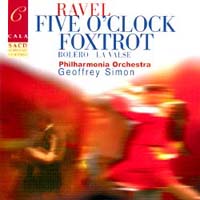 |
Five O'Clock Foxtrot
Philharmonia Orchestra
Geoffrey Simon
Stephanie Chase ~ violin
Han de Vries ~ oboe
…
Having found his musical voice remarkably early on, Ravel went on to produce a string of works which show his powers in full flight. The mastery exhibited in these pieces was such that, after many failed attempts to win the coveted Prix de Rome, a scandal erupted.
 Ravel's fame was assured. Many saw him as the leading light of the younger generation of composers after Debussy. In the years leading up to the start of World War I he positively flowered, producing one work of major importance after another.
Ravel's fame was assured. Many saw him as the leading light of the younger generation of composers after Debussy. In the years leading up to the start of World War I he positively flowered, producing one work of major importance after another.The events of 1914 were to change everything. Disqualified from joining the army due to his small size and slight build, Ravel served as an ambulance driver for most of the war. He lost many friends in the battle and then, in 1917, suffered the death of his adored mother. Profound depression and ill-health followed. Till his death in 1937, he was never again the same man. Insomnia plagued him, and frequent black moods would silence his creative powers for months, sometimes years on end. Shortly after completing his two magnificent piano concertos in 1931, the brain disease which would eventually lead to his death began to manifest itself. After an unutterably sad illness leaving his intellect intact but unable to communicate, Ravel died aged 62.
The music heard here was digitally recorded with the Philharmonia Orchestra in February 1991, at St Jude-on-the-Hill, Hampstead, London. Cala Records is pleased now to present the recording with the benefit of SACD/Surround technology.
